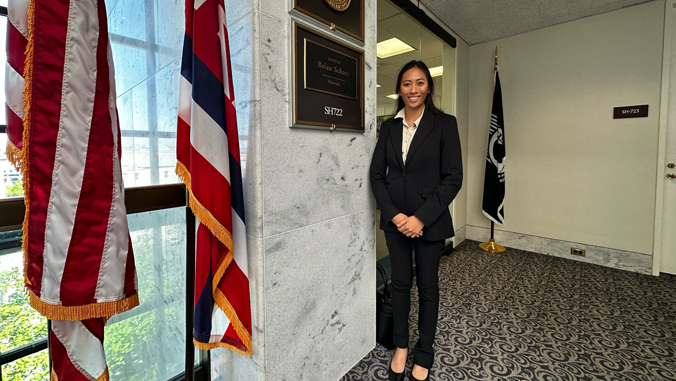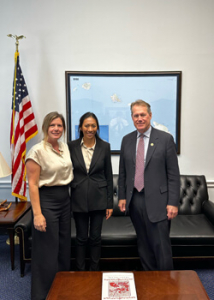
Approximately 90% of Hawaiʻi’s food is imported. There are also barriers to food production that create an uncertain future for the state’s agriculture industry. However, a University of Hawaiʻi at Mānoa graduate student is hoping to plant a new seed and create a more positive future in Hawaiʻi’s quest to become self-sufficient.

Destiny Apilado is pursuing her master’s of environmental management in the College of Tropical Agriculture and Human Resources Department of Natural Resources and Environmental Management (NREM). Under the guidance of Associate Professor Susan Crow, Apilado is part of a team that received a $40-million U.S. Department of Agriculture (USDA) grant to implement sustainable, climate-smart practices and establish stronger markets for locally produced, healthy food and forest products.
In April 2023, Apilado traveled with Crow to Washington, D.C. to represent Hawaiʻi in the U.S. Climate Alliance Natural and Working Lands Learning Lab, where the group drafted policy-oriented documents to support climate-smart, healthy soils. They also met with Hawaiʻi’s congressional delegation and their representatives to discuss their USDA grant-supported Climate Smart Commodities (CSC) project that will serve four purposes:
- Overcome barriers in implementing sustainable practices
- Build markets that support circular economies
- Improve technical assistance through network-based organizations and decision support tools
- Address inequities in supporting the local producer community
“Overall, these meetings were really good for starting the dialogue between the CSC team and federal offices to let them know we are a resource for ag related climate policy, and let them know how the CSC project can be supported on their end, such as through investments in infrastructure and workforce that will allow the project to be impactful past the life of the project,” said Apilado, who was one of three NREM graduate students selected in 2022 to receive 2022–24 Hauʻoli Mau Loa Foundation fellowship.
“The USDA project gives us a unique opportunity to improve system-level resilience and equity for food and forest products in Hawaiʻi and embed working lands within the state’s decarbonization strategy,” Crow said. “There are a lot of moving pieces, but at the foundation are the producers and practitioners who work to grow products in Hawaiʻi, for Hawaiʻi. A primary aim is to assist producers to overcome barriers to implementing climate-smart practices. But, first a deep understanding of historical and current inequities that contribute to those complex and persistent barriers is needed.”
Addressing farming inequalities
Apilado’s capstone project aligns with the work she is doing with the CSC team. Her project, “Informing Place-Based Equity for Hawaiʻi’s Local Producers,” is focused on investigating the barriers and challenges local farmers face in obtaining resources, such as federal grants, loans and incentives. The main concern is that the USDA eligibility criteria are set at a national level, and does not recognize the unique conditions that define the small-scale and diversified operations on our isolated island setting.
Apilado, who is entering her second and final year in the program, will survey small-scale and/or Indigenous local producers and producer organizations to document the barriers to resources they face. Her findings can then be used to inform decision makers and policy makers of how policy can be modified to reduce inequities.
Cultivating love of farming, food production
The Mililani High School alumna started her higher education journey at Leeward Community College, earning the 2019 New Century Transfer Pathway Scholar from Hawaiʻi, which is awarded to the student receiving the highest All-USA Academic Team application score in each state.
Apilado transferred to UH Mānoa with a desire to go into pharmaceutical sciences after graduating with her bachelor’s degree in biochemistry in 2021. However, in her post-pandemic gap year, she worked on a Kauaʻi farm through the Worldwide Opportunities on Organic Farms program. There, she fell in love with local agriculture and met Assistant Professor Mehana Vaughan, who inspired her to pursue a degree in NREM. Through her graduate work, she wants to make the future of agriculture in Hawaiʻi equitable and sustainable.
“Farmers are busy people with little extra time on their hands,” Apilado said. “From managing pests, to facing high costs of water and land, it’s hard to make farming profitable in Hawaiʻi. Farmers face many challenges and bear great risks to bring food to our plates and we owe it to them to make the resources they need more accessible.”
—By Marc Arakaki

